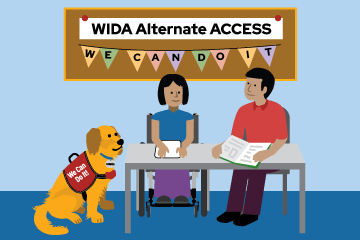Federal Law and Policy Foundations

WIDA is founded upon and grounded in United States federal law and policy regarding English learner students.
In the United States of America, English learner (EL) students in public K-12 education systems have a constitutionally protected right to equitable educational opportunity under Title VI of the Civil Rights Act of 1964.
Supreme Court and Circuit Court decisions, Office for Civil Rights (OCR) and Department of Justice (DOJ) communications, and reauthorizations of the Elementary and Secondary Education Act (ESEA) have affirmed the protected status of EL students. The following selection of landmark decisions, statements, and laws delineate federal requirements toward providing equitable educational opportunity for ELs, and are central to WIDA’s products and services in support of state, district, and school educators to meet those requirements.
Timeline
1970-1991
May 25, 1970 memorandum – OCR
The Identification of Discrimination and Denial of Services on the Basis of National Origin clarified and obligated compliance with Title VI requirements for districts to provide equal education opportunity to language minority students.
Lau v. Nichols (1974)
The United States Supreme Court decided that public school districts must provide supplemental language instruction for students with limited English proficiency.
Castañeda v. Pickard (1981)
The United States Fifth Circuit Court of Appeals decision established a three-pronged assessment of sufficiency for bilingual education programs to meet requirements under Lau v. Nichols and the Equal Educational Opportunities Act of 1974.
Plyler v. Doe (1982)
The United States Supreme Court decided that states cannot constitutionally deny students a free public education on account of their immigration status.
September 11, 1984 Memorandum – OCR
The Policy Regarding Title VI Language Minority Investigations asserted the legal foundation for OCR investigations based on the May 25, 1970 Memorandum; and clarified school district responsibility to identify language minority limited English proficient students.
December 3, 1985 Memorandum; reissued April 6, 1990 – OCR
The Policy Regarding the Treatment of National Origin Minority Students Who Are Limited English Proficient described OCR procedures to evaluate compliance with Title VI of the Civil Rights Act of 1964. It set forth criteria to evaluate if there is a need for an Alternative Program and whether the Alternative Program is likely to be effective.
September 27, 1991 Memorandum – OCR
The Policy Update on Schools’ Obligations Toward National Origin Minority Students With Limited-English Proficiency expanded criteria from previous memoranda for OCR use in conducting Lau compliance reviews; asserted the validity of OCR’s use of the Castañeda standard for compliance; expanded elements of program efficacy; and introduced program exit criteria.
2000-present
August 2000 Pamphlet - OCR
The Provision of an Equal Education Opportunity to Limited-English Proficient Students reviewed extant memoranda and court cases to summarize a review of school district requirements for and compliance issues regarding services for national-origin minority students who have limited English language skills.
No Child Left Behind (NCLB) Act of 2001
The reauthorization of the Elementary and Secondary Education Act defines limited English proficient (LEP) students and established Title III program requirements for instruction of LEP students. It required states to adopt English language proficiency (ELP) instructional standards and to administer ELP assessments that measure and report student proficiency scores in each domain of Listening, Speaking, Reading, and Writing and composite scores of Literacy, Comprehension and Overall. It also required states to establish and report performance against Annual Measurable Achievement Objectives.
May 6, 2011 Dear Colleague Letter
The DOJ and OCR joint letter upheld Plyler v. Doe, asserting the federal obligation for school districts to provide equal educational opportunities to all children residing in their district. It also specified that any practices that chill, discourage or exclude student enrollment based on their parent/guardian’s actual or perceived citizenship or immigration status contravene federal law.
January 7, 2015 Dear Colleague Letter
The DOJ and OCR joint letter provided an overview of state education agency and school district obligations to English learner (EL) students. It detailed comprehensive common civil rights issues regarding requirements to serve EL students.
English Learner Tool Kit – 2015
The Office of English Language Acquisition (OELA) published the tool kit as a companion to the 2015 Dear Colleague Letter to support state and local education agencies fulfill obligations detailed in the letter. 10 chapters contain an overview, sample tools and resources. There is one chapter for each section in the Dear Colleague Letter.
Every Student Succeeds Act (ESSA) 2015
The current reauthorization of the Elementary and Secondary Education Act sustains Title III program and ELP assessment reporting requirements from NCLB and requires states to use common identification and exit criteria for all EL students in their state. It replaced Annual Measurable Achievement Objectives for EL students by requiring states to include ELP assessment measures in their Title I accountability systems. It also supports native language content assessment.
August 2021 Resource – DOJ and OCR
The Confronting Discrimination Based on National Origin and Immigration Status affirmed for parents and educators that public school districts must: enroll students independent of immigration status, offer language assistance services to all EL students, and provide critical information in a language that parents and guardians can understand.
Newcomer Toolkit - June 2023
The Office of English Language Acquisition (OELA) published the Newcomer Toolkit to help U.S. educators; elementary and secondary teachers, principals, and other school staff who work directly with immigrant students – including asylees and refugees – and their families. 5 chapters include an overview, sample tools and resources.
Family Toolkit - September 2023
The Office of English Language Acquisition (OELA) published the Family Toolkit to help families choose education services that meet their child’s needs. U.S. educators, elementary and secondary school teachers, principals, and other school staff can share the toolkit as a resource for English learners and their families.




